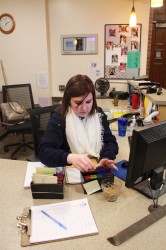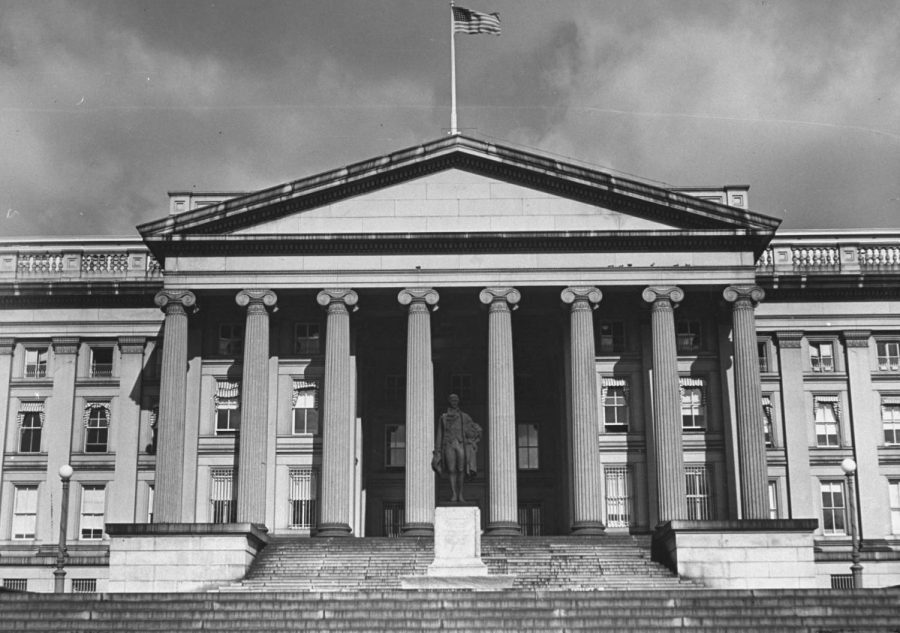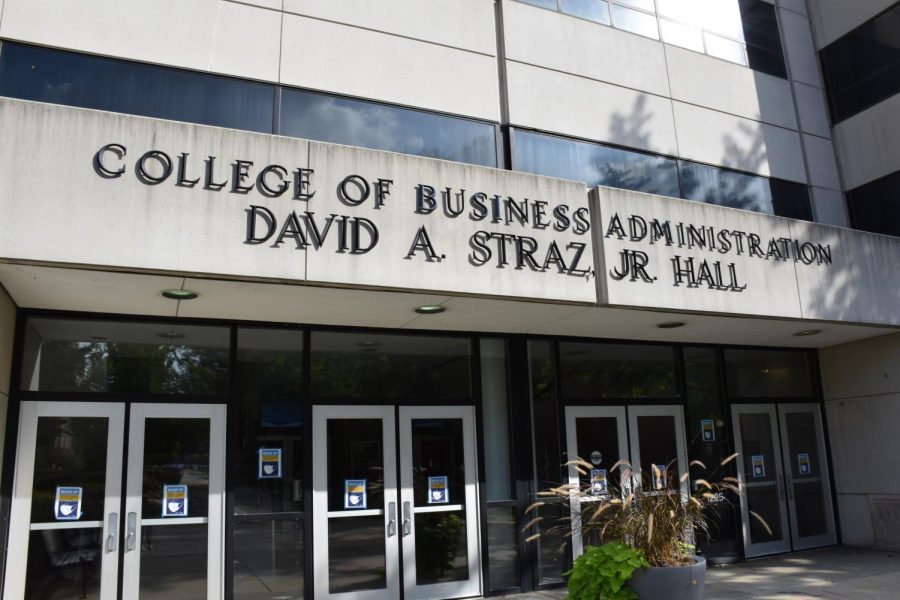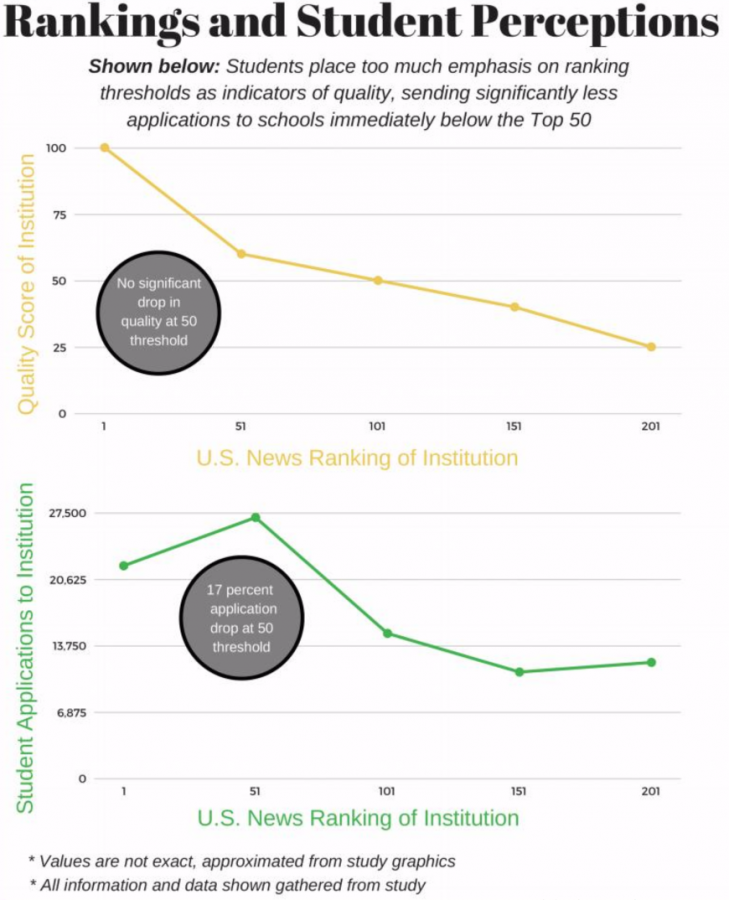
For Rebecca Doyle, the wage she is paid by the university as a desk receptionist does not come close to covering all of her bills.
“I know, personally, the amount hours I could get per week as a DR was not enough on the minimum wage,” Doyle explained. “So I had to get a second job.”
Doyle, a sophomore in the College of Communication, is among one of the many students employed by the university who receives just above the federal minimum wage of $7.25 for each hour of work. Andrew Brodzeller, associate director of university communication, said the university does not have total numbers of students receiving minimum wage.
“Each college, division and office determines the pay rate for individual student positions with the majority of the positions beginning at minimum wage,” Brodzeller said.
Responsible for paying for her own tuition and next year’s rent, Doyle had to take another job at Sobelman’s restaurant on campus to ensure she could cover all her expenses.
“Its just wasn’t enough to make ends meet,” Doyle said about working solely as a desk receptionist about seven hours per week.
MINIMUM WAGE IN THE U.S.
Doyle’s situation is not unusual in Wisconsin and the 28 other states where the the federal level of $7.25 per hour sets the minimum wage for the state. This means that the federal rate applies regardless if the state does not have any minimum wage law or if the minimum wage is set lower.
The remaining 21 states — including Wisconsin’s neighboring states of Illinois and Michigan — all have wages set above the federal mandate.
Washington claims the highest mandated state minimum wage at $9.32 per hour with Oregon following closely behind with $9.10 per hour, though smaller municipalities within a state can mandate a wage requirement. For example, while California’s minimum wage is set at $8 each hour, the city of San Francisco recently increased its minimum wage to $10.55, making it the highest in the country.
The minimum wage debate drifted back into the spotlight when President Barack Obama announced his support of any congressional effort to raise the federal minimum wage to $9 an hour and to automatically adjust it with inflation in his 2013 State of the Union address. This February, the president issued an executive order increasing the minimum wage of federal government workers to $10.10 during his 2014 State of the Union address.
Obama’s executive order follows 13 states that raised their minimum wage requirement at the beginning of this year.
The wage of $10.10, which would also be indexed to inflation, is the goal for most proponents of increasing the federal minimum wage because, according to a Feb. 18 study from the Congressional Budget Office, this new wage would increase the income of 16.5 million people and lift 900,000 people above the poverty threshold. The CBO also predicted the $10.10 wage would cost the economy 500,000 jobs.
The last time the federal minimum saw an increase was in 2009, when the federal government set the wage at $7.25.
But despite this new attention on minimum labor wages, it is not likely to gain any feasible traction in Congress. The Republican majority in the U.S. House of Representatives will likely strike down any legislation that would hike wages.
Multiple bills were introduced in the House on the subject, but all were stalled in the House Committee on Education and the Workforce. Most recently, Rep. Tim Bishop (D-N.Y.) filed a petition to discharge the Fair Minimum Wage Act of 2013 from the committee, which amassed 196 cosponsors. The Senate counterpart, written by Sen. Tom Harkin (D-Iowa), was referred to the Committee on Health, Education, Labor and Pensions, where it awaits further action.
Duane Swank, a professor of political science who specializes in labor policy, said chances of a federal minimum wage increase are “greater now than they are in past years,” due to rising income inequality. However, he said he doubts it will happen during the Obama administration, unless the Democrats gain the majority in both houses in the 2016 elections.
Likewise in Wisconsin, Swank said he does not expect any sweeping legislation anytime soon.
“I don’t see a political scenario that would shift in the next one to two years,” Swank said. With a Republican in the governor’s office and a Republican majority in both the State Assembly and State Senate, a minimum wage increase by the state is far more unlikely in Wisconsin than in Congress.
In Wisconsin, public opinion polls are mixed, depending on the institution that conducted it.
According to a Marquette Law Poll, 62 of Wisconsin voters percent favor an increase in the minimum wage with 35 percent opposing the increase. However, after the respondents were reminded the minimum wage was set at $7.25, 25 percent said it should remain where it is, 33 percent said it should be increased to about $9 per hour, 25 percent said it should be around $10 per hour, 5 percent said about $11 per hour and 10 percent said it should be $12 or more per hour.
A study from the Wisconsin Manufacturers & Commerce yielded different results. This February, a poll among Wisconsin voters found that if respondents were informed of job losses that would result from a minimum wage raise, they were less likely to support it. With that, 51 percent were against a raise and 39 percent were in favor.
Minimum wage at the state level will most likely get attention in this year’s governor election, as Democratic gubernatorial candidate Mary Burke publicly supported a $10.10 requirement.
WAGES AT MARQUETTE
For Marquette students — and other college students in Wisconsin — student wages can be expected to stay roughly the same. But what would happen at Marquette if the federal minimum wage was raised to $9 or $10.10 as suggested by its proponents?
As of now, Brodzeller said the university’s budget planning process includes forecasting models for student employee wages. The forecasts are updated regularly and allow the university to plan for potential increases.
“Suggestions to change the minimum wage have been raised at the state and national level, but they are only proposals and it is unclear when they will be considered,” Brodzeller said in an email. “The proposals indicate the earliest any change would go into effect is July 1, 2016. The university will continue to monitor the topic.”
Swank said if Wisconsin was hit with a minimum wage increase, however, Marquette would likely feel some “modest” effects from the hike. He suggested the university may try to absorb the costs through raising tuition and potentially reducing the number of student jobs available.
At Marquette, student employees can be paid anywhere from $7.25 to $15 per hour depending on the qualifications and skills needed for a specific job. Starting wages at Marquette are broken down into five grade levels, with the lowest-skilled jobs that require no prior experience starting from $7.25 to $8.25 per hour and the highest paying jobs starting from $8.20 to 15.00 per hour. Jobs paying at this highest level require a high level of competence, special skills and sometimes independent research, undergraduate education and previous technical training, according to the Marquette Central website.
Among the students who get paid the federal minimum or slightly higher include the university tutors, desk receptionists and service staff at the Rec Center. Student jobs with the highest-paying starting salaries include Department of Public Safety LIMO drivers with a starting wage of $9 per hour, Phonathan callers at $8.50 per hour, university dining shift managers at $9 per hour and the Rec Center’s certified group fitness experts at $10.15 per hour.
The Tribune also reached out to both Raynor Library, the Office of Admissions and the Alumni Memorial Union, but did not receive a response for an inquiry about student salaries by press time.
For students like Doyle employed in the lower pay grades, the low wages combined with the university’s limit on the number of hours a student can work translates into the reality that one university job is not enough for students to financially support themselves. Even if Doyle worked all 20 hours — which she said is a rarity for student desk receptionists — she would still be making less than $150 each week.
It is Marquette’s policy that students employees work no more than 20 hours during the academic year, according to Marquette Central’s website. Though the school makes exceptions, during academic breaks, where students can work up to 37.5 hours, overtime hours are not allowed.
Doyle said this was one of the reasons she will not be returning to her job as a desk receptionist next year.
“It’s a great job, there are a lot of perks to it,” Doyle said. “But for the hoops we have to jump through to get it, there isn’t enough compensation.”
With the rising costs of tuition, she said she needs a job with a wage that will rise with it.





